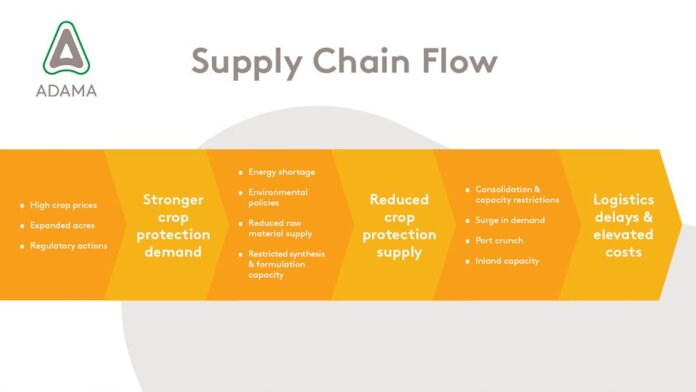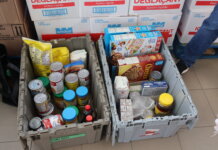EAST HANTS: Supply chain vulnerabilities are cropping up in the Canadian agricultural sector. Fresh produce is scarce on grocery stores’ shelves, global trade networks are facing shipping delays and producers are struggling to feed their livestock. It all points to one thing: crop producers will face challenges obtaining inputs for this growing season.
ADAMA Canada is looking to help growers be more strategic this year to ensure a quality crop, as other crop protection companies announce worldwide product shortages. Shortages are prevalent in protection products like glufosinate, glyphosate and MCPA, and supply chain interruptions are inevitable for the Canadian ag sector in 2022.
“Producers have to put in a lot more effort in their planning this year,” said Cornie Thiessen, General Manager at ADAMA Agricultural Solutions Canada, a leading global crop protection company providing solutions to combat weeds, insects and disease. “We want producers to better understand supply chain interruptions and how they will impact individual farms.
“Our message is simple: do what is agronomically right by planning ahead and have discussions with your retailers earlier than normal.”
Break The Bundle
For years, manufacturers have encouraged producers to bundle crop protection products to capitalize on discounts.
This year, farmers should focus on doing what’s agronomically right for their operations. The best way to do that, said Thiessen, is to break the bundle.
“You may count on seed from one company and expect a discount on fungicides, for example. That discount won’t be worth much if you end up being short on seed,” said Thiessen. “Put the bundle aside this year. Think about meeting your agronomic needs. Once your needs are mapped out, secure the supply.”
The next step, according to Thiessen, is working with a retailer to identify missing programming opportunities. Farmers shouldn’t rely on any single supplier to give them a full suite of products. Thiessen said farmers are going to have to be more creative to guarantee access to product in a timely manner.
“Farmers will need to be careful here. Someone may take their order and even their money, but will they be able to fulfill an order? Suppliers may not be able to get product to retailers, and subsequently to farmers, in time,” Thiessen asked. Crop prices are high and ADAMA expects producers will seek to maximize every available acre.
“Though farmers may say ‘I’ve been using this product to solve this need,’ they may have to reevaluate by looking and saying, ‘what is the agronomical problem I need to solve?‘ Those problems may be: I need this weed gone or I need this bug dead. Farmers may have to meet with their retailer and talk about what they normally use, but also what other way is there to meet the same agronomic need?”
And The 2022 Canadian Crop?
In order to ensure a productive crop, Thiessen said the key is to get off to a good, weed-free start, and there are a number of options to consider:
- Invest in pre-seed products due to uncertainty around supply for in-crop options. Having less competition for moisture and nutrients helps the crop start off right.
- More thought on modes of action, potentially including residual chemistries to get some in-crop control.
- Plant at a higher seed rate (but due to seed shortages, this may not be possible.)
- Fertilizer is expensive, but additional fertilizer can help crops outcompete weeds and reduce herbicide reliance.
- Scout and consider more spot applications when spraying insecticide. When insects show up, it’ll be tempting to keep spraying.
- Leverage the variable rate precision agricultural tools in 2022.
- Fungicides will experience less supply chain disruption, due to adequate starting inventories. If you have a good crop, protect it from disease. Plant heavier to reduce weed pressure to avoid multiple herbicide applications. This could mean a stronger need for fungicides.
Why the interruption?
Thiessen said there are a number of factors resulting in the current state of supply chain interruptions including COVID-19, global logistics and port congestion, trade friction and natural disasters.
To ensure your operation isn’t affected by supply chain interruption, speak with your local ADAMA sales representative today by visiting ADAMA.COM/CANADA.
Error, group does not exist! Check your syntax! (ID: 9)
















